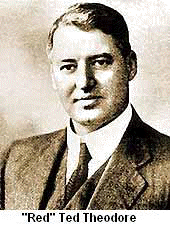WE now find ourselves committed to more and more military spending and activity as well as ancillary countermeasures to terrorism. One of the lesser appreciated consequences lies in threats to world shipping. Stan Correy on a recent Background Briefing for ABC's Radio National did an enviable job on the new impediments to world sea trade. Industry, commerce and governments, he said, had almost achieved "frictionless trade" when along came the new hazards of bombs in ships, ports and containers. Counter-measures will be difficult and will drain money away from more profitable activities. We need only look at the Australian government's revision of policies in this segment of the Pacific. The Solomons contingent of soldiers and police won't be the last in keeping order in the area – and one reason is that failed island states invite terrorist exploitation. Hence, from a stance of avoiding neo-colonialism we have gone to one of regional policeman.
There's no need to list all the ways that we are forced to divert money to fending off the agents of nihilism. They speak for themselves.
A hard consequence is that no federal government of any party will add real money to its science and education spending for years to come. They won't. Every budget will show money for defence, border security, intelligence, surveillance and such. Every budget will probably try to keep spending on education and science about the present level – but no more, notwithstanding the spin merchants.
It may make no sense. Educated warriors are stronger than semi-educated warriors. Defence needs the latest knowledge that can come only from R&D. They'll get pretty well what is laid on now and no extra. Of course our major parties are philistines but they are also aware that fear is a stronger force than a thirst for enlightenment. Dollars to (hopefully) keep us safe will win votes. Dollars to make us more intellectually able will not.
So far as budgets are concerned, the science/education lobby cannot hope for the kind of massive fund injections needed to lift our national mind.
Finished? Caput? Checkmate?
Not inevitably. Look off-budget. Look for another source of finance. Treasurer Peter Costello is fond of pointing out that the US and the UK and half of Europe are running national debts of 40% and more of GDP. Japan is running an astronomical national debt of around 170% of GDP. By contrast, says Peter Costello, Australia's national is in the range of 5% to 7% of GDP.
This is absurdly low. To put the case as a generalisation: Australia has plenty of room to borrow against its national assets provided the borrowings are used for specific purposes and can be relied on to repay themselves with interest.
 History students will recall the story of "Red" Ted Theodore*
and his proposed fiduciary issue of a mere £20 million to alleviate the Great
Depression. Timid souls in politics at the time cried out that he was going to "roon"
the country. One of the what-ifs of Australian history is what-if the federal
government of 1931 had followed the Theodore line. The late Warren Denning,
political correspondent and author, used to put the Theodore theory into a
simplified form:
History students will recall the story of "Red" Ted Theodore*
and his proposed fiduciary issue of a mere £20 million to alleviate the Great
Depression. Timid souls in politics at the time cried out that he was going to "roon"
the country. One of the what-ifs of Australian history is what-if the federal
government of 1931 had followed the Theodore line. The late Warren Denning,
political correspondent and author, used to put the Theodore theory into a
simplified form: